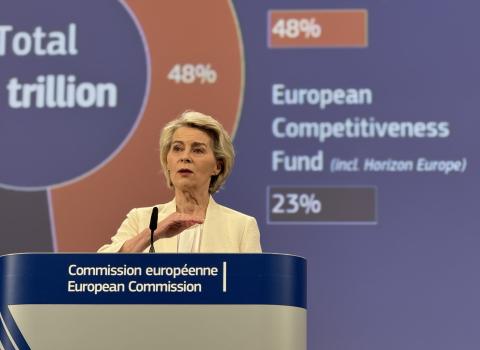While genetic weapons targeting populations and countries are still some way off, security fears over genomics data are growing. But any restrictions could hold back a vital area of medical research

The US should consider restricting the export of its human genomics data to guard against potential future attacks by Russia or China with DNA targeted weapons, according to a scientific risk assessment.
This raises the prospect that the genomics data which in the past 20 years has become the lifeblood of large swathes of medical and public health research could be restricted for security reasons. China is already allegedly imposing controls on the use of its own information.
“There’s a recognition that there’s a military dimension, military potential to this,” said Robert Shaw, an export control expert at the Middlebury Institute of International Studies, Monterey, California, co-author of the risk assessment report. “There is a dual-use dimension, absolutely,” he said.
For now, the prospect of a DNA-targeted weapon aimed at whole countries, ethnicities, families or individuals is the stuff of a James Bond adventure - literally. In 007’s latest outing, No Time to Die, the villain of the piece threatens to eradicate millions of people, using nanobots programmed to attack specific DNA sequences.
Reassuringly, the Scientific Risk Assessment of Genetic Weapon Systems, says that the capabilities in No Time to Die remain fictional, at least for now.
Targeting genetic markers present in one population would inevitably spill over into other countries due to interbreeding, it says, making a precise weapon difficult to create. The US’s ethnic diversity therefore gives the country a “protective effect” against attack, it concludes.
In addition, launching a genetic weapon into a population remains a major challenge.
While raising the alarm, Shaw said there are currently no “specific, confirmed military programmes” developing genetic weapons.
However, such weapons could become increasingly feasible in the next 5 – 15 years due to technological advances.
“While the targeting approaches described in this report are technically challenging and data hungry, because of ongoing research these technical barriers are likely to erode over time,” the report says.
Even if it is hard to target entire countries, genetic weapons could prove “uniquely suited” to carrying out covert assassinations, where “lack of attribution is paramount.”
The case for encryption
As the report notes, “Once genomic information is shared, it cannot be unshared.”
Given these risks the US should, “Explore applicability of national-level export controls on human genomic information”, the report recommends.
The US should also start to differentiate between human and non-human genomics data. The exception to that is the genomes of staple crops, “the genomic homogeneity of which makes them particularly vulnerable to targeting by a genetic weapon,” the report says.
The prospect of DNA being “weaponised” strengthens the case for “encrypting and limiting the sharing of genetic data,” said Allison Berke, director of advanced technology at the Institute for Economic Policy Research at Stanford University.
But privacy concerns are an even stronger reason for greater control, because genetic information can be used to track individuals, identify family relationships and medical conditions, she said.
Berke stressed that currently, “There is not enough genetic variation between nations to make a genetically-targeted weapon sufficiently accurate, and there are easier means to target individuals than a customised genetic weapon.”
Nonetheless, China-focused national security think tanks in the US are increasingly worried, according to Shaw. “This topic is already coming up in those circles,” he said.
While the US has been open in sharing genomics data, China has been “increasingly protective” of its own, and in 2019 introduced new legislation restricting foreign access, the report says.
Shaw said that there is “informed speculation” that China is “worried” about the prospect of genetic weapons because its own population is relatively ethnically homogenous. “That may lend itself to…genetic weapons targeting a bit more easily, than let’s say by comparison the US, which is a much more ethnically diverse population,” he said. Science|Business has contacted the Chinese Academy of Sciences for a comment.
Continual monitoring
The report is not the first to warn that genetic data could have a military use. Last year, the US National Academy of Sciences (NAS) published a report called Safeguarding the Bioeconomy, which discusses – if only briefly - the prospect of genetic targeting of populations.
The idea “poses a number of technical difficulties”, it says, but warns that “new biotechnologies are continually being developed” and the area requires “continual monitoring”.
Concerns have also been raised during the past year in the US and Europe about the harvesting of genetic data by private Chinese companies. The focus is less on the risk of a genetic weapon, and instead on privacy, blackmail or intelligence concerns - hostile governments could identify people predisposed to depression, for example.
“The propensities of national leaders to act in certain ways, which could be influenced by their genetic makeup, could well be of interest to adversarial intelligence agencies,” says the NAS report.
There are further concerns over how genetic data could intersect with artificial intelligence. “AI may enable a pathogen to be specifically engineered for lethality or to target a genetic profile—the ultimate range and reach weapon,” warned the final report of the US’s National Security Commission on Artificial Intelligence, released earlier this year.
It also sounds the alarm over Chinese genomics data gathering. “The US cannot afford to look back in 10 years and be ‘surprised’ by the biotechnology equivalent of Huawei,” it cautions.
Currently, genetic data is not explicitly part of any of the various intergovernmental agreements that control the export of dual-use technologies, said Shaw. There are generally broad exemptions for scientific research, and a general reluctance to control the flow of raw sequence data, as opposed to the actual means to create a weapon.
Any inclusion of genetic data in these regimes would “really represent a fundamental change in export control” and get a “strong pushback” from academic communities who use it in their work.
Even so, privacy concerns may start to restrict genetic data flows. The EU is currently working out to what extent genetic information is protected by its General Data Protection Regulation, said Berke.
“Any regulatory dimension to the sharing of genetic data, it’s probably going to be privacy related,” said Shaw. “And the same would hold true in the US.”





 A unique international forum for public research organisations and companies to connect their external engagement with strategic interests around their R&D system.
A unique international forum for public research organisations and companies to connect their external engagement with strategic interests around their R&D system.